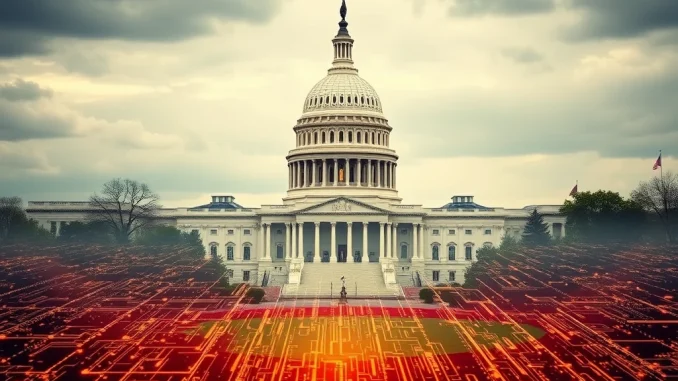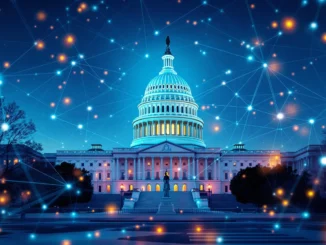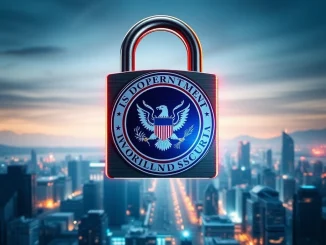
Hold onto your digital wallets, crypto enthusiasts! A political storm is brewing in Washington, and it directly impacts the future of cryptocurrency regulation in the United States. Six U.S. Senators, including the ever-vocal crypto skeptic Elizabeth Warren, are raising serious alarms about a recent move by the Department of Justice (DOJ). What’s got them so riled up? The DOJ’s decision to dismantle its dedicated crypto enforcement unit, the National Cryptocurrency Enforcement Team (NCET). Let’s dive into why this decision is causing such a stir and what it could mean for the crypto landscape.
Why the Fury? Senators Criticize DOJ’s Crypto Enforcement Stance
Imagine you’re trying to build a secure and trustworthy financial system. Now, imagine the agency responsible for policing that system suddenly decides to downsize its dedicated crime-fighting unit. That’s essentially what’s happening in the crypto world, according to these senators. Their core argument, laid out in a strongly worded letter to Deputy Attorney General Todd Blanche, is that disbanding the NCET sends a dangerous message. It effectively signals to illicit actors that the U.S. is taking a less aggressive stance on crypto enforcement, potentially creating a haven for illegal activities.
Here’s a breakdown of the senators’ key concerns:
- “Free Pass” for Money Launderers: The most pointed criticism is that dismantling the NCET gives a “free pass” to crypto money launderers. Senators believe this weakens the deterrent against using cryptocurrencies for illicit financial activities.
- Weakened Federal Oversight: The NCET was specifically created to focus on the complexities of crypto-related crime. Its disbandment is seen as a step back in federal oversight, making it harder to effectively police the digital asset space.
- Exploitation by Criminals: Senators warn this move could embolden various types of criminals – drug traffickers, terrorists, fraudsters – who are known to exploit loopholes in financial systems. They fear it will become easier for these actors to operate within the crypto ecosystem.
In essence, the senators are painting a picture of increased risk and vulnerability for the crypto market, arguing that a dedicated crypto enforcement team is crucial for maintaining its integrity and preventing it from becoming a playground for criminals.
Decoding the DOJ’s Crypto Unit Decision: A Shift in Strategy?
The DOJ’s rationale behind this decision is crucial to understanding the full picture. While the agency hasn’t explicitly stated its reasoning for disbanding the NCET, reports suggest a potential shift in strategy. Previously, the DOJ had signaled a tougher stance, even hinting at holding developers of crypto tools like mixers and wallets legally responsible if their tools were used for illegal activities. This approach was met with considerable pushback from the crypto industry, raising concerns about overreach and stifling innovation.
The current move to disband the specialized DOJ crypto unit and step back from directly targeting tool developers could indicate a recalibration. It might suggest a move towards:
- Decentralized Enforcement: Instead of a centralized unit, the DOJ might be aiming to integrate crypto enforcement responsibilities more broadly across its various divisions and U.S. Attorney’s offices. This could mean leveraging existing expertise within different departments to tackle crypto-related crimes.
- Focus on Actors, Not Tools: Shifting away from targeting tool developers and focusing more directly on individuals and entities engaging in illegal activities. This approach could be seen as more targeted and less likely to stifle legitimate technological development.
- Resource Reallocation: It’s also possible that the DOJ is simply reallocating resources based on evolving priorities and perceived threats. Crypto crime is just one facet of the broader criminal landscape, and resource allocation decisions are often complex and dynamic.
However, without a clear public statement from the DOJ, these are largely interpretations. The senators’ letter highlights the lack of transparency and the potential negative consequences of this shift, regardless of the underlying rationale.
Elizabeth Warren and the Persistent Crypto Critic Voice
It’s no surprise to see Senator Elizabeth Warren leading the charge in criticizing the DOJ’s decision. She has consistently been a vocal critic of the cryptocurrency industry, raising concerns about its risks to consumers, financial stability, and its potential for illicit use. Her involvement adds significant weight to the senators’ letter and underscores the ongoing tension between regulators and the crypto world. Elizabeth Warren crypto stance is well-documented, and she often emphasizes the need for stricter regulations and greater oversight.
Warren’s perspective is rooted in a belief that the crypto market is still largely unregulated and poses significant risks. She and other like-minded policymakers argue for a proactive approach to regulation to prevent financial instability, protect consumers from scams, and curb illicit activities. The disbandment of the NCET, in this context, is seen as a step in the wrong direction, weakening the very safeguards they believe are necessary.
The Broader Implications for Crypto Regulation Moving Forward
This development raises crucial questions about the future of crypto regulation in the U.S. Will this DOJ decision signal a broader softening of the regulatory stance? Or is it merely a tactical adjustment in enforcement strategy? The answers to these questions will significantly shape the trajectory of the crypto industry in the coming years.
Here are some potential implications to consider:
- Regulatory Uncertainty: The lack of clarity surrounding the DOJ’s decision adds to the existing regulatory uncertainty in the crypto space. This uncertainty can stifle innovation and investment as businesses struggle to navigate an unclear legal landscape.
- Increased Scrutiny from Congress: The senators’ letter demonstrates that Congress is paying close attention. This incident could lead to increased scrutiny of the DOJ’s crypto enforcement efforts and potentially trigger legislative action to mandate a stronger regulatory framework.
- Global Regulatory Alignment: The U.S.’s approach to crypto regulation has global implications. If the U.S. appears to be softening its stance, it could influence regulatory approaches in other countries, potentially leading to a more fragmented global regulatory landscape.
- Industry Response: The crypto industry itself is likely to react to this development. Some might see it as a welcome sign of reduced regulatory pressure, while others might worry about the potential for increased illicit activity and reputational damage to the industry as a whole.
Is This Really a “Free Pass” for Crypto Criminals?
The million-dollar question remains: is disbanding the NCET truly a “free pass” for crypto criminals, as the senators criticize DOJ action suggests? It’s too early to definitively say. The impact will depend on how the DOJ implements its revised strategy and how effectively it integrates crypto enforcement into its broader operations. If the DOJ can demonstrate a robust and coordinated approach, even without a dedicated unit, the concerns might be allayed.
However, the senators’ concerns are valid and reflect a broader anxiety about the potential for cryptocurrencies to be exploited for illicit purposes. Maintaining public trust in the crypto ecosystem requires effective law enforcement and a clear commitment to combating financial crime. The DOJ’s decision has undoubtedly raised questions about that commitment, and it will be crucial for the agency to address these concerns and demonstrate its ongoing dedication to ensuring the crypto space is not a haven for criminal activity.
Conclusion: Navigating the Uncertain Waters of Crypto Enforcement
The DOJ’s decision to disband its crypto enforcement team has thrown a curveball into the ongoing saga of cryptocurrency regulation in the U.S. While the agency’s motivations remain unclear, the strong pushback from senators highlights the deep divisions and ongoing debate about how best to regulate this rapidly evolving industry. The coming months will be critical in observing how this shift in approach impacts crypto enforcement efforts and the broader regulatory landscape. One thing is certain: the conversation around crypto regulation is far from over, and this latest development has only added fuel to the fire. Stay tuned as we continue to track this developing story and its implications for the future of digital assets.



